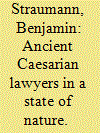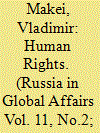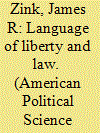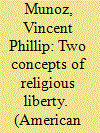| Srl | Item |
| 1 |
ID:
069782


|
|
|
| 2 |
ID:
122361


|
|
|
|
|
| Publication |
2013.
|
| Summary/Abstract |
The human rights debates, which have been high in the past two decades, have proven futile. They increasingly make it clear that it is impossible to change attitudes that are enrooted in centuries-old specific cultural, religious, and other underpinnings.
|
|
|
|
|
|
|
|
|
|
|
|
|
|
|
|
| 3 |
ID:
090827


|
|
|
|
|
| Publication |
2009.
|
| Summary/Abstract |
Although contemporary Americans take it for granted that a "constitution" is a written document, written constitutions were almost unprecedented at America's founding. James Wilson, one of the most significant yet overlooked of America's founders, offers a comprehensive theory of America's written constitution. Wilson argues that the written-ness of the U.S. Constitution serves two essential functions. As an initial matter, it memorializes the primacy of liberty by announcing that the authority of government derives only from a free people. Perhaps more importantly, however, the written constitution uplifts and refines the character of its citizens, and thus helps to constitute a people. A review of Wilson's writings and speeches reveals how, even in a rights-centric political order, the written constitution helps to cultivate moderate and civic-minded citizens without diminishing the fundamental importance of individual rights.
|
|
|
|
|
|
|
|
|
|
|
|
|
|
|
|
| 4 |
ID:
147246


|
|
|
|
|
| Summary/Abstract |
Due in part to the influence of Michael McConnell, free exercise exemptionism is generally thought to be compatible with, if not dictated by, the founders’ church-state political philosophy. This article rejects that position, arguing instead that America's constitutional tradition offers two distinct conceptions of religious liberty: the founders’ natural rights free exercise and modern moral autonomy exemptionism. The article aims to distinguish these two approaches by clarifying how they are grounded upon divergent philosophical understandings of human freedom and by explaining how they advance different views of what religious liberty is, how it is threatened, and, accordingly, how it is best protected. The article also attempts to demonstrate how our modern approach expands the protection for religious liberty in some ways but limits it in others.
|
|
|
|
|
|
|
|
|
|
|
|
|
|
|
|